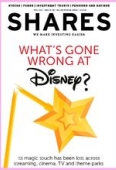Archived article
Please note that tax, investment, pension and ISA rules can change and the information and any views contained in this article may now be inaccurate.
What a change of management means for investors in popular trust Mid Wynd

MID WYND INTERNATIONAL
AIC Sector – Global
Ticker – MWY
Share price – 717p
Discount to NAV – 1.5%
Dividend yield – 1.1%
Ongoing charges – 0.61%
Source: The AIC, Artemis
As highlighted in our ‘funds with stamina’ story on 31 August, one of the investment trusts that has achieved at least a 6% total return in seven out of the past 10 years is Mid Wynd International (MWY). This is the popular global fund managed for the past decade by Simon Edelsten at Artemis which looks for growth from long-term trends. But with change afoot in the management of the trust, can its consistent performance be maintained?
Focused on quality stocks and with a disciplined approach intended to make it more resilient at times of crisis, the relatively concentrated portfolio offers exposure to several compelling structural growth themes including ‘Automation’, ‘Sustainable Consumer’ and ‘Lower Carbon World’.
Mid Wynd did underperform the benchmark in the year to June 2023, with net asset value total returns of 5.6% lagging the 11.3% from the MSCI All Country World Index. This underperformance was mainly due to Mid Wynd not owning Nvidia (NVDA:NASDAQ) and Apple (AAPL:NASDAQ) and arose despite strong performances from other holdings such as Microsoft (MSFT:NASDAQ), Amazon (AMZN:NASDAQ), Alphabet (GOOG:NASDAQ) and Adobe (ADBE:NASDAQ).
WYND OF CHANGE
These were Mid Wynd’s last results (6 September) under Artemis, as the mandate moves to Lazard Asset Management at the beginning of October 2023. In February, it was announced that Simon Edelsten, who had built a strong retail investor following, will retire from Artemis at the end of 2023 and that fellow manager Alex Illingworth is also leaving the business. The news prompted Mid Wynd’s board to review proposals from a number of fund management groups with Lazard eventually awarded the mandate.
LAZARD LOOKS A DECENT FIT
Although it is a storied name in the world of finance, Lazard doesn’t currently manage any investment trusts though it previously managed the World Trust Fund, a fund of funds investment company wound up in 2019. Lazard has an overwhelmingly institutional client base and is less well-known to UK retail investors.
But as the Mid Wynd board explained in the annual results statement, this lack of awareness of Lazard as a manager of UK retail funds ‘was not a deterrent to the board in appointing the company as manager of our assets.
‘The board specifically sought out managers who, while producing excellent performance, were potentially not well known to retail investors. The over-riding priority for the board was to find the best manager pursing an approach to investment not dissimilar to that familiar to investors in our company.’
Reassuringly for Mid Wynd’s investors, Lazard follows a similar stock selection approach to Artemis. Both focus on identifying high quality companies with strong sustainable profitability which can compound over the long term and Lazard’s ‘Global Quality Growth’ strategy aligns well with the Mid Wynd ethos, which includes investing at the right valuations in companies which have the potential to compound investors’ capital at attractive and sustainable rates.
MEET LOUIS & BARNABY
Mid Wynd’s new managers are fundamental stock pickers Louis Florentin-Lee and Barnaby Wilson, co-managers of the Lazard Global Quality Growth strategy which delivered a net total return of 248.8% after fees, versus 176.1% (gross) for the MSCI All Country World Index and 138.2% for the IA Global sector over the 10 years to June 2023.
These excess returns are a product of their disciplined approach to assessing the sustainability of high returns on capital from quality companies and, crucially, of not overpaying for their shares. Economic theory asserts that high returns in an industry will attract increased competition, which means the returns on capital achievable will eventually decline.
However, this ‘fade’ in returns has not always materialised and there are companies which have consistently reported high returns despite the threats from increased competition.
Leaning on the experience of a team of around 70 analysts, Wilson and Florentin-Lee’s day job is to scour the globe to find similar high-quality businesses with this form of replicable high return with limited or no ‘fade’ to returns on capital. And since these companies achieve particularly high returns on re-invested capital, they tend to re-invest their cash back into the business and pay low levels of dividends as a result. But for investors, the compounding effect from re-investing the cash flows from high-returning businesses to secure higher future returns is particularly rewarding.
WHAT CAN INVESTORS EXPECT?
Existing and prospective Mid Wynd shareholders can expect the portfolio to be concentrated with high active share and low portfolio turnover. ‘Our typical holding number is about 40 to 50 stocks’, Florentin-Lee informs Shares. ‘And the Global Quality Growth approach is very simple, we buy great companies, but where we have a good conviction and understanding in the thing that makes them great, the competitive advantage or economic moat, and where we’ve developed conviction those moats will last into the future and allow the business to maintain high returns on capital.’
Florentin-Lee and Wilson make sure they purchase shares in these elite businesses ‘when the market is anticipating a decline or a “fade” in their returns on capital faster than we would expect.
‘The idea is we own these companies for many years to allow our clients to get exposure to those compounding earnings and cash flows and that’s really what drives the returns of the portfolio, because essentially they are sharing in the economic wealth these businesses are producing.’
The misconception the Lazard managers take advantage of is the fact the market ‘applies the economic law of competition too broadly to these great companies, i.e., that these great returns will attract competition and thereby push down their returns on capital to a cost of capital or a corporate average,’ continues Florentin-Lee.
While they accept competition and disruption exist, Florentin-Lee says ‘we can point to companies that have been able to defy that economic law for decades. Microsoft’s been doing it for 30 years, Coca-Cola (KO:NYSE) for over 50 years and parts of LVMH (MC:EPA) for well over 150 years. We’re going to find and invest in companies where we determine that the company will sustain its returns for longer than the market expects. And we’ve designed investment tools that help us establish that conviction.’
Another point to note is that Lazard is differentiated from other quality growth approaches through ensuring the sources of competitive advantage are widely diversified, including brands and technology, as well as other factors such as scale, strong position in niche industries, providing critical low-cost components or regulation.
This broader spread of competitive advantages in the portfolio ‘allows us to gain exposure to a wider range of sectors than perhaps other quality managers,’ says Florentin-Lee. ‘But not all sectors – we’ve never invested in utilities, telecoms, oil majors, those business don’t consistently generate the returns on capital that we insist on.’
Wilson makes the point that turnover in the Lazard Global Quality Growth strategy has averaged ‘between 10 and 15%, so that’s an average holding period of seven to 10 years, whereas the current manager (Artemis) has a turnover significantly higher than that’.
He also understands that ESG factors can significantly impact the ability of businesses to generate profits and significantly impact the way in which these companies are valued. ‘Part of the role of our analysts is to make sure they’ve understood any ESG factors that could impact on the ability of a business to continue to make the level of returns that we would hope it will make going forwards.
What we’re trying to deliver for clients in terms of outcomes is very, very similar to the current manager, but the way in which we’re going to do it is a little bit different.’ Wilson also notes that Mid Wynd ‘gives us the opportunity to bring that institutional investment approach and make it available to retail investors.’
Shareholders can expect changes to the portfolio, which currently holds stocks ranging from luxury goods giant LVMH and US healthcare and insurance firm UnitedHealth (UNH:NYSE) to payments processor Mastercard (MA:NYSE) and Taiwan’s TSMC (2330:TPE), the world’s largest contract chipmaker, but also some similarities in holdings between new and old investments.
Florentin-Lee says he and Wilson ‘will be sensibly but as quickly as possible transitioning it to our Global Quality Growth strategy, so it will be exactly the same. There are lots of names that are already in the portfolio, so once we’ve got our hands on the trust, a Mid Wynd investor won’t open their portfolio and go “what the hell?” when they see it.’
Important information:
These articles are provided by Shares magazine which is published by AJ Bell Media, a part of AJ Bell. Shares is not written by AJ Bell.
Shares is provided for your general information and use and is not a personal recommendation to invest. It is not intended to be relied upon by you in making or not making any investment decisions. The investments referred to in these articles will not be suitable for all investors. If in doubt please seek appropriate independent financial advice.
Investors acting on the information in these articles do so at their own risk and AJ Bell Media and its staff do not accept liability for losses suffered by investors as a result of their investment decisions.
Issue contents
Feature
Great Ideas
News
- Greggs experiences some growing pains but there is no cause for alarm
- Federal Trade Commission lawsuit could be the first step in an Amazon break up
- The UK stock market is almost back on top in the European rankings
- Why Digital 9 Infrastructure’s shares are down 60% over one year
- Future shares jump 20% as publisher paints improved full-year picture
- Could a wet summer derail recovery at Wetherspoons?
- Soft drink and snack giant PepsiCo's earnings have surprised positively twice this year

 magazine
magazine








